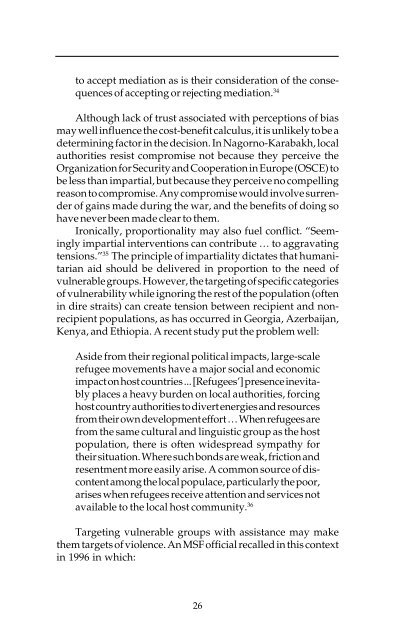Brown Cover OP 43 - The Watson Institute for International Studies
Brown Cover OP 43 - The Watson Institute for International Studies
Brown Cover OP 43 - The Watson Institute for International Studies
You also want an ePaper? Increase the reach of your titles
YUMPU automatically turns print PDFs into web optimized ePapers that Google loves.
to accept mediation as is their consideration of the consequences<br />
of accepting or rejecting mediation. 34<br />
Although lack of trust associated with perceptions of bias<br />
may well influence the cost-benefit calculus, it is unlikely to be a<br />
determining factor in the decision. In Nagorno-Karabakh, local<br />
authorities resist compromise not because they perceive the<br />
Organization <strong>for</strong> Security and Cooperation in Europe (OSCE) to<br />
be less than impartial, but because they perceive no compelling<br />
reason to compromise. Any compromise would involve surrender<br />
of gains made during the war, and the benefits of doing so<br />
have never been made clear to them.<br />
Ironically, proportionality may also fuel conflict. “Seemingly<br />
impartial interventions can contribute … to aggravating<br />
tensions.” 35 <strong>The</strong> principle of impartiality dictates that humanitarian<br />
aid should be delivered in proportion to the need of<br />
vulnerable groups. However, the targeting of specific categories<br />
of vulnerability while ignoring the rest of the population (often<br />
in dire straits) can create tension between recipient and nonrecipient<br />
populations, as has occurred in Georgia, Azerbaijan,<br />
Kenya, and Ethiopia. A recent study put the problem well:<br />
Aside from their regional political impacts, large-scale<br />
refugee movements have a major social and economic<br />
impact on host countries ... [Refugees’] presence inevitably<br />
places a heavy burden on local authorities, <strong>for</strong>cing<br />
host country authorities to divert energies and resources<br />
from their own development ef<strong>for</strong>t … When refugees are<br />
from the same cultural and linguistic group as the host<br />
population, there is often widespread sympathy <strong>for</strong><br />
their situation. Where such bonds are weak, friction and<br />
resentment more easily arise. A common source of discontent<br />
among the local populace, particularly the poor,<br />
arises when refugees receive attention and services not<br />
available to the local host community. 36<br />
Targeting vulnerable groups with assistance may make<br />
them targets of violence. An MSF official recalled in this context<br />
in 1996 in which:<br />
26

















